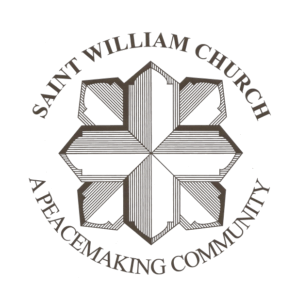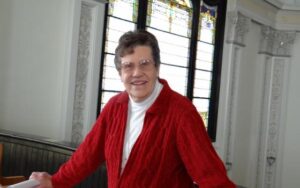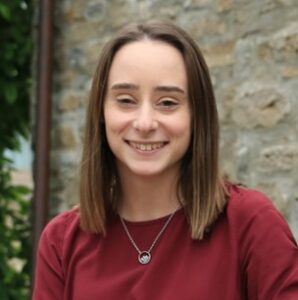Moving forward with Roots & Wings

Ellie and Casey at the "Raíces y Alas" conference of the National Catholic Council for Hispanic Ministry (NCCHM) in Washington, DC
Discerning Deacons was thrilled to be invited to serve as exhibitors at the Raices y Alas (Roots and Wings) conference of the National Catholic Council for Hispanic Ministry (NCCHM) in Washington, DC, April 26-30.
We were able to engage participants in conversations about synodality, women’s leadership roles, and the discernment of the Church about ordaining women to the diaconate.
Hispanic Catholics have a critical role to play in the growth of the synodality and intercontinental unity for the renewal of the faith, said presenters as they reflected on the V Encuentro, and worked to develop a pastoral plan for Hispanic/Latinx Catholics who now make up 50% of the U.S. Catholic Church. Their influence and complex realities will continue to shape Church priorities into the future.
More than 400 people participated in a full schedule of workshops, panels, and listening sessions focused on four priority areas — social justice, Hispanic families, pastoral juvenil (youth ministry) and pastoral formation. The conference theme focused on prophetic voices building bridges to a new era.
The conference included recorded and live remarks to conference participants by Pope Francis, Cardinal Mario Grech, General Secretary of the Synod of Bishops on Synodality, and Sr. Nathalie Becquart, Undersecretary of the Synod. Present throughout the conference was Archbishop Christophe Pierre, Apostolic Nuncio to the United States, and NCCHM’s Episcopal Liaison Bishop Alberto Rojas of San Bernardino, Calif. A half dozen other bishops participated in the conference at varying times.
Immigration reform remains a critical issue for Hispanic Catholics who live on the front lines of family separation, blended families navigating complex immigration statuses, and poverty wages that put added stress on millions of families living in the shadows and overworking to make ends meet. Jaqueline Romero, a DREAMER, shared her stations of the cross from the perspective of a migrant crossing the border. The conference dedicated a full day to advocacy on April 27. Conference participants gathered in small groups by their state of residence and visited

with their legislators’ offices, by zoom or in person. They gathered with several Catholic bishops for a press conference in front of the Capitol. Immigration reform “recognizes the God-given dignity of every person in our nation, citizens and non-citizens alike”. “We are brothers and sisters in the eyes of Jesus Christ”, said Washington Auxiliary Bishop Mario Dorsonville, chair of the Migration Committee of the United States Catholic Conference of Bishops “We come in prayer to ask members of Congress, Republicans and Democrats, to work together to create the solutions we all long to see.”
Nearly 100 youth and young adults were present at the conference, a major priority of NCCHM president Elisabeth Roman to ensure that young people were visible and given opportunities to speak.
One of the most prophetic talks from the youth to the adults was by Martin Soros, age 18, who was presented with the “Alas de la Pastoral Hispana” award. The biggest internal obstacle the U.S. Church faces, said Soros, is polarization and division, causing huge numbers of youth to leave the church. The teen lamented that bishops have contributed to the polarization by arguing at length over who gets to receive communion, leaving youth to feel that their current realities, experiences, and sufferings are not seen and do not matter. The renewal of the Church, he suggested, has to integrate tradition with the forward movement of the Holy Spirit, which calls on Catholics to encounter people on the peripheries. Adults need to understand, he said, that every young person is possibly in danger of leaving the Church, and that every action adults take to see, engage with, and validate a young person is important and fundamental.
Loyola Marymount University theology professor Fr. Allan Deck S.J., the first president of NCCHM 30 years ago, commended conference participants for their commitment to listening to the youth and to multiple perspectives. “We’ve been able to listen to our differences here,” he said, observing that supporting our youth means being willing to listen a lot. Latinos, he said, like to operate with consensus. They do not like losing people. “We can model communion in diversity,” he said.
Boston College theology professor Dr. Hosffman Ospino traced the fractures young people have experienced in the last 20 years, including the clergy sex abuse crisis, ideological battlegrounds, the pandemic and now the Russian war against Ukraine. In the midst of all these challenges, “God has imagined humanity with a plan for our salvation,” said Ospino. Now is the time to engage in the Catholic imagination to articulate a new vision for these times, create new structures, and redefine the areas where the Church can invest in the formation of its people.
During the conference opening keynote address, Mar Muñoz, Executive Director of the Secretariat of Cultural Diversity in the Church for the USCCB, referred to Hispanic Catholics as Gente Puente – people who are called to be bridgebuilders of understanding across differences by seeking a common goal to work on (remarks begin at 1:08). She noted that it had been a dream of Pope John Paul II that the Americas could emerge as one united continent. Hispanic Catholics have a lot of experience with the Encuentro process from which to keep leading the Church in the U.S. towards synodality, she said.
Dr. Emilce Cuda, Secretary of the Vatican’s Pontifical Commission for Latin America, underscored the desire to build bridges across the continents. “We are committed to all the people of Latin America, and this includes those living in the United States,” said Cuda. “There must be dialogue between the North and the South”. Cuda was instrumental in the effort earlier this year to bring together college students from North and South America into a synodal dialogue with Pope Francis.
Peruvian Archbishop Miguel Cabrejos, president of CELAM (Latin American Episcopal Council), said that he was there to open new pathways of encounter and synodality between Latin America, the U.S. and Canada (remarks begin at minute 36). He traced Latin American Church’s history and growing practice of synodality from Vatican II to major conferences in Medellin, Aparecida, the Amazon synod and most recently the historic ecclesial gathering in Mexico City. Pope Francis, he noted, has said that the Latin American Church has much to share with the world about developing a synodal heart of ministry. Synodality, said Archbishop Cabrejos, means discerning the Holy Spirit’s movement in our current reality and responding pastorally to today’s challenges as we serve God’s people with the same passion Jesus had. The archbishop said that CELAM would continue to build alliances with groups like NCCHM who want to build the church’s synodal present and future.
The conference highlighted areas of continued growth for Catholics as we respond to the needs of the times in a spirit of discernment. “We need women in important roles who can start to open doors for their own peers and have their opinion considered,” said Saul Llasca, Hispanic Ministry Coordinator for the Archdiocese of Indianapolis in a talk about pastoral formation. His remark received applause from conference participants.
It’s interesting to note that in the First Encuentro of 1972 one of the final conclusions (#35) was a recommendation that the Church receive women as deacons. How remarkable to discover how our own roots and mission in Discerning Deacons is traceable to the prophetic witness of the First Encuentro. We hope to be part of the wings – taking flight for a synodal church, renewed through the work of justice and inclusion and that integrates our deepest hopes and dreams for our families, our youth, and our communities.


